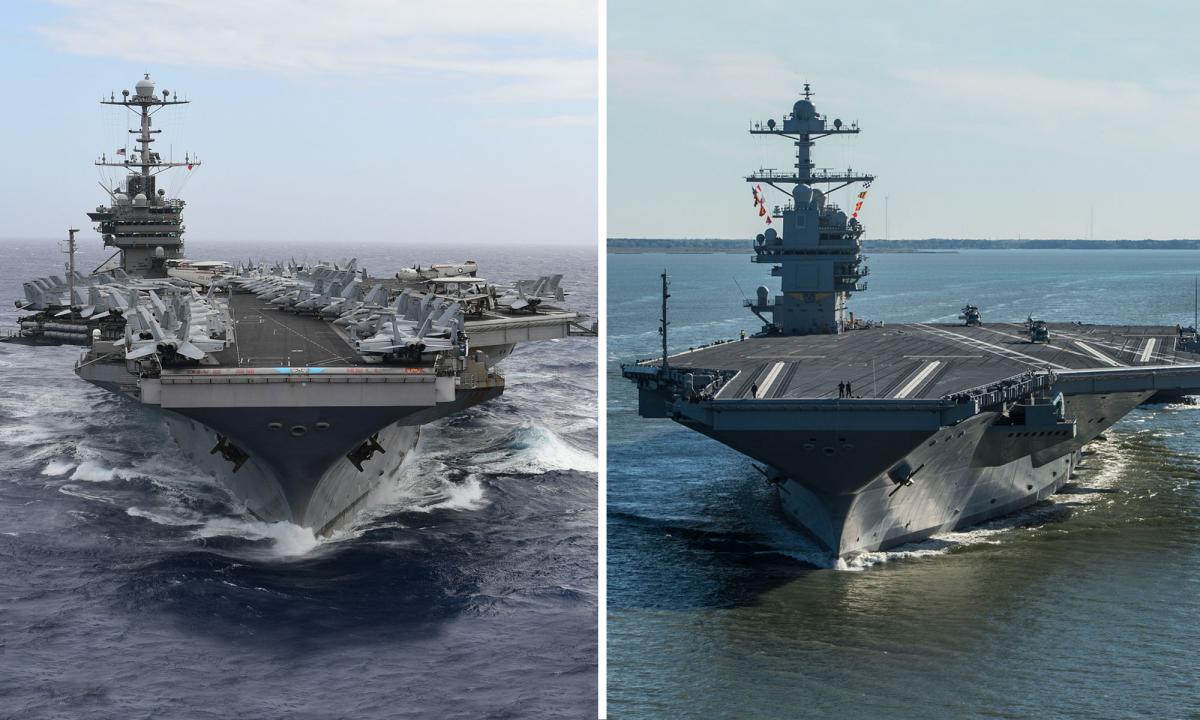How many more posts until the Admins rename Spekkio to “Donny”? 42??They can use the terminology all they want; the people you point to are not above political pandering for more funding to buy cool toys.
The great thing about adding the word 'near' to 'peer' is that you don't have to define exactly how near they are. There are more than a few tactical publications, signed by Admirals, that don't consider these nations' assets to be 'peer' or 'near peer.'
We want a world where we can impose our political, military, and economic will uncontested. We had a good 20 year run where that pretty much happened, and now China and Russia are able to exert more influence in their geographic regions. That doesn't make them peers, it just means they're more than what they were. But we'll call them peers and make it sound like they're fixing to invade us any minute if it means it approves the next [insert major military program that needs funding].
The bottom line is that saying someone is a peer doesn't make it true. We're now playing the same game we played in the 60s-80s with the Cold War -- the USSR was a 'near peer,' until 1991 when we all found out it wasn't even close.
Nice cliches. You really think that China or Russia is capable of launching a mainland invasion of the U.S. at any moment now?
I don't think I'm underestimating anything. I acknowledge that China has built a relatively formidable brown water Navy. Unfortunately, China's 'brown water' contains the most traveled shipping lanes in the world and that conflicts with our economic interests, and that sucks. But the fact remains that they're a brown water Navy.
I'm also not underestimating that setting up a base of operations near China in any future conflict would be nearly impossible, simply because of geographic constraints. But that has a lot more to do with the shape of the Earth than it does with the state of China's military.
However, I wouldn't go so far to call China a peer. They have enough of a military and production to make armed conflict with them on their own territory somewhere between undesirable and hard to win, but they don't have the ability to exert their influence globally. When China starts conducting routine ISR missions in the Gulf of California with a CSG sitting 50 miles from LA while Russia routinely deploys multiple SSNs/SSGNs to the Gulf of Mexico and has a Carrier sitting 50 miles off of DC, I'll start worrying about these countries being 'near peer.'
-
Please take a moment and update your account profile. If you have an updated account profile with basic information on why you are on Air Warriors it will help other people respond to your posts. How do you update your profile you ask?
Go here:
Edit Account Details and Profile
You are using an out of date browser. It may not display this or other websites correctly.
You should upgrade or use an alternative browser.
You should upgrade or use an alternative browser.
Road to 350: What Does the US Navy Do Anyway?
- Thread starter Randy Daytona
- Start date
Spekkio
He bowls overhand.
China's sphere of influence is limited to the far east. They are a threat only because we have an interest there as well, and we can't just run over them anymore. Again, this doesn't make them a peer wrt naval capabilities, it just elevates them above most of the rest of the world.A) I didn’t say that.
B) Do I believe China and Russia each have the capability (across the DIMEFIL spectrum) to take unilateral actions toward securing their national interests globally and trying to regain great power status, even if it could result in conflict with the United States and our allies? Yes. Is “launching a mainland invasion of the U.S. at any moment” one of their national interests? Almost certainly not.
No, I'm simply looking at the holistic capabilities of both countries. We are calling China a peer, but they don't have the capabilities we do. They aren't even close. They can be a challenging adversary in many respects in a theoretical conflict in the western Pacific, but most of that is driven by logistical challenges of fighting an offensive campaign across the pacific in a low-end conflict.You seem to think that being able to threaten the US along our own shoreline is necessary to declare China as a peer. That's a strange perspective not shared by many professionals who work this problem. You can't simply say, "Well, the Admirals all want more funding," then proceed to casually dismiss anything they say that doesn't align with your opinion.
There are plenty of places that China can effectively threaten US interests with their current force structure. Anyone who has studied the various CONOPS in 7th fleet would find serious fault with your dismissive attitude toward the PLAN. Maybe you're getting lost in your own semantics, but your definition and views are out of sync with CNO, CPF, C7F and everyone on down with any stake.
We need to zoom out a bit and recognize that we are upset because China can now defend itself from U.S. warships that are operating hundreds of miles from its shores. No country even maintains the capability to do that to us on a continuous basis, and if they could it would make national news.
We are conflating "threaten US interests" with "near peer." The two are not the same. I agree that the Chinese military is formidable enough to affect our foreign policy in the far east. I disagree that they are 'near peer' to the point that we would have to worry about defeat in phase III operations.
According to General Kelly, immigrants from South America were the existential threat to America. I haven't seen another COCOM commander use that phrase in their posture statements since, although I may have missed something. Who's right?No, but they are the only two countries that are an existential threat to the United States. They both also have a formidable, and in China's case a rapidly expanding, arsenal that we would likely have considerable difficulty in grappling with in a war.
Last edited:
This is patently false. Read more.China's sphere of influence is limited to the far east.
Spekkio
He bowls overhand.
I was speaking from a military standpoint, but yes from an economic standpoint they reach out a lot further...including a stronghold in the U.S.This is patently false. Read more.
How much can you separate the two? Heard of Huawei?I was speaking from a military standpoint, but yes from an economic standpoint they reach out...
Try again.China's sphere of influence is limited to the far east.
China's sphere of influence is limited to the far east. They are a threat only because we have an interest there as well, and we can't just run over them anymore. Again, this doesn't make them a peer wrt naval capabilities, it just elevates them above most of the rest of the world.
No, I'm simply looking at the holistic capabilities of both countries. We are calling China a peer, but they don't have the capabilities we do. They aren't even close. They can be a challenging adversary in many respects in a theoretical conflict in the western Pacific, but most of that is driven by logistical challenges of fighting an offensive campaign across the pacific in a low-end conflict.
We need to zoom out a bit and recognize that we are upset because China can now defend itself from U.S. warships that are operating hundreds of miles from its shores. No country even maintains the capability to do that to us on a continuous basis, and if they could it would make national news.
We are conflating "threaten US interests" with "near peer." The two are not the same. I agree that the Chinese military is formidable enough to affect our foreign policy in the far east. I disagree that they are 'near peer' to the point that we would have to worry about defeat in phase III operations.
I am really struggling to wrap my head around the fact an active duty Line officer seriously holds these opinions.
The people whose job it is to actually study, model, and plan this stuff, both military and civilian, do not agree with you.
Disagreeing with higher authority is fine, as long as it's based on hard data rather than just your gut feeling, but I find it rather unlikely you have access to information they don't.
He probably serves on boomers and doesn't get out much.
D
Deleted member 67144 scul
Guest
China's sphere of influence is limited to the far east. They are a threat only because we have an interest there as well, and we can't just run over them anymore. Again, this doesn't make them a peer wrt naval capabilities, it just elevates them above most of the rest of the world.
Not simply the Far East. Have you seen what they're doing across the African continent? They've become very influential in many countries there. They're even trying to push us out of Djibouti.
How much can you separate the two? Heard of Huawei?
Huawei has been taking an increasingly massive share of the global semiconductor space. Even with heavy lobbying by the US semiconductor industry to push the Trump administration to take a very hard line against Chinese (and Singaporean) companies, Huawei may still end up taking the lead in 5G and future mobile/wireless technology. This is apart from already being the #1 telecomm equipment manufacturer and #2 smartphone manufacturer in the world. The April 2018 ZTE ban (which was lifted a few months later) coupled with a $1 billion penalty was a strong show of force at least against a single company, but if anything, they and other Chinese semiconductor companies will look to further decrease their dependence on US-made chips and equipment considering ZTE's own fatal dependence.
Last edited by a moderator:
Thanks..... I think you just wrote out in several hundred words what others had done in a sentence, or two.Not simply the Far East. Have you seen what they're doing across the African continent? They've become very influential in many countries there. They're even trying to push us out of Djibouti.
Huawei has been taking an increasingly massive share of the global semiconductor space. Even with heavy lobbying by the US semiconductor industry to push the Trump administration to take a very hard line against Chinese (and Singaporean) companies, Huawei may still end up taking the lead in 5G and future mobile/wireless technology. This is apart from already being the #1 telecomm equipment manufacturer and #2 smartphone manufacturer in the world. The April 2018 ZTE ban (which was lifted a few months later) coupled with a $1 billion penalty was a strong show of force at least against a single company, but if anything, they and other Chinese semiconductor companies will look to further decrease their dependence on US-made chips and equipment considering ZTE's own fatal dependence.
Spekkio
He bowls overhand.
And I'm struggling with how someone can call China a peer adversary with a straight face. Can you link me to one of these military leaders that China is capable of simultaneously fighting and defeating two high-end blue water navies in full-scale conflict?I am really struggling to wrap my head around the fact an active duty Line officer seriously holds these opinions.
The people whose job it is to actually study, model, and plan this stuff, both military and civilian, do not agree with you.
Disagreeing with higher authority is fine, as long as it's based on hard data rather than just your gut feeling, but I find it rather unlikely you have access to information they don't.
There is a large spectrum between being almost completely untouchable, which is the status quo we previously enjoyed in the 1990s and 2000s, and a country having the capabilities that we do. We're so accustomed to being invulnerable that the thought of losing a single ship in naval conflict is making everyone lose their minds.
The capability gap is closing. It hasn't closed fully, not even close.
And I'm struggling with how someone can call China a peer adversary with a straight face. Can you link me to one of these military leaders that China is capable of simultaneously fighting and defeating two high-end blue water navies in full-scale conflict?
There is a large spectrum between being almost completely untouchable, which is the status quo we previously enjoyed in the 1990s and 2000s, and a country having the capabilities that we do. We're so accustomed to being invulnerable that the thought of losing a single ship in naval conflict is making everyone lose their minds.
The capability gap is closing. It hasn't closed fully, not even close.
If you’re expecting the standard to be a “peer” to be full 100% parity in all areas, even the Soviet Union at its peak never reached that standard.
I don’t really care to get into a debate over semantics. If you want to use a different standard than senior service leadership, go for it. Might make communicating with folks a little difficult though, as you’re seeing here.
As for “losing single ship”, either you’re using hyperbole or you’re totally disconnected from the MCO scenario projections. Neither is conducive to further debate.

Retiring the Truman Early Is a Necessary Strategic Decision
The Navy’s decision to forego the midlife refueling of the USS Harry S. Truman (CVN-75) at the expense of some forward presence is the right one—and long overdue.
This could be brilliant or not, but I couldn’t get past the horribly written first sentence.
If the author says the Ford will be so awesome capability-wise that we won’t need the Truman, he is wrong. The only reason an aircraft carrier is relevant and useful is location location location (i.e. ~2 acres of U.S. territory, anywhere at sea, with a CVW). The Ford can’t ever be two places at once.


